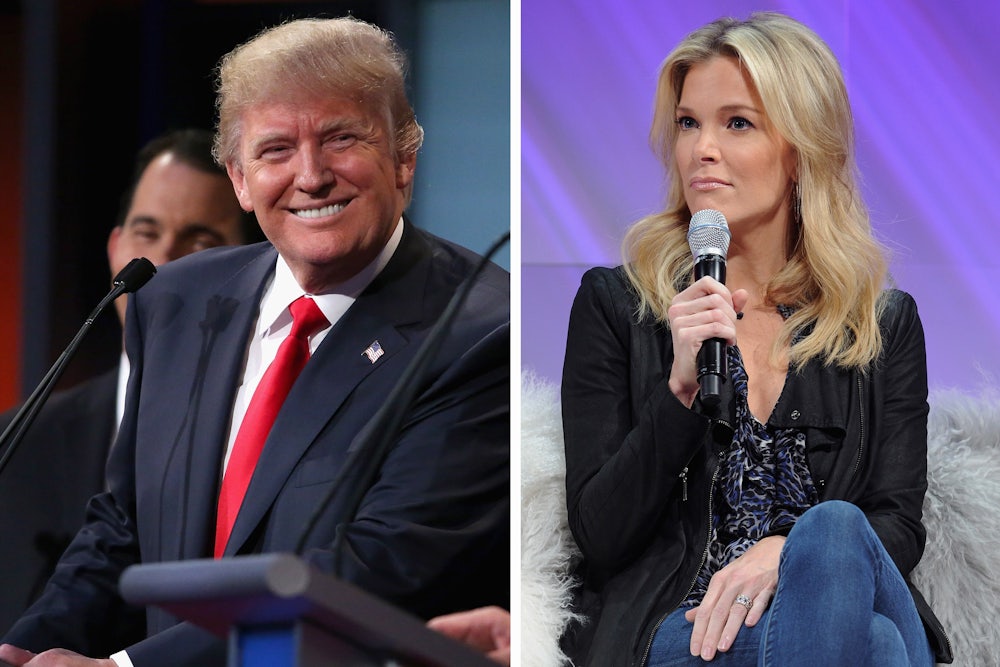One of Donald Trump’s great strengths as a politician is that he’s a hell of a counter-puncher. On the debate stage and campaign trail, he has flummoxed and thwarted much more politically experienced rivals like Jeb Bush and Marco Rubio by responding to their jabs with a quickness and confidence they themselves lack. Yet Trump’s self-assurance deserts him completely when confronted with a female adversary, be it Rosie O’Donnell, Megyn Kelly, Carly Fiorina or, most recently, Senator Elizabeth Warren. Which bodes well, of course, for his likely general-election opponent, Hillary Clinton, whose formidable and unflappable character
make her exactly the sort of woman that Trump has the hardest time reacting to.
An old-fashioned sexist boor, Trump tends to divide the world into a simple binary: men are rivals to be bested and women are potential sexual conquests. When he’s confronted by a strong, assertive woman outside the mating arena, his synapses tend to short-circuit, leading him to odd and often self-destructive behavior. Before Carly Fiorina’s presidential bid fizzled out, she was the only Republican who had managed to faze Trump at all. He walked back his initial attempt to insult her looks and found himself booed by the debate audience on November 10 when he snapped, “Why does she keep interrupting everybody?”
When Trump met yesterday with the editorial board of the Washington Post, columnist Ruth Marcus asked Trump a question about racism in the criminal justice system. According to the transcripts, a few minutes later while answering another question, Trump made a strange aside: “Okay? I mean, [Editor’s note: Trump points at Ruth Marcus] she kills me, this one—that’s okay, nice woman.” At the same meeting, Opinions Deputy Digital Editor Karen Attiah asked Trump a question about his negative poll numbers among Latinos and his racially divisive rhetoric. After the meeting, Trump briefly chatted with Attiah. “I really hope I answered your question,” he said, then added, “Beautiful.”
This inappropriate comment—in effect, an attempt to dismiss her serious question by bringing in the irrelevant detail of her appearance—is the flip side of Trump’s reference to O’Donnell as a “disgusting pig” or Kelly as “crazy.” Trump’s long-running Kelly obsession notably began when she challenged him during the first Republican debate last August on his long history of flinging insults at women. The ensuing eight months of insult-flinging reveals him to be as touchy as a burn victim, a brittle bully who can’t forget a slight and keeps nursing his wounded pride to the point of making himself a public joke.
Consider this tweet:
If crazy @megynkelly didn't cover me so much on her terrible show, her ratings would totally tank. She is so average in so many ways!
— Donald J. Trump (@realDonaldTrump) March 19, 2016
“She is so average in so many ways!” are words that might come from a 14-year-old rejected for a date. Yet Trump is an adult, a supposedly successful businessman making a bid for the most important political office in the world.
Or consider this tweet:
Everybody should boycott the @megynkelly show. Never worth watching. Always a hit on Trump! She is sick, & the most overrated person on tv.
— Donald J. Trump (@realDonaldTrump) March 18, 2016
“She is sick, & the most overrated person on TV” suggests a personal injury and deeply felt affront, very different in tone from Trump’s hearty mockery of “low energy” Jeb Bush or “Little Marco” Rubio. When he quarrels with an O’Donnell, a Fiorina, or a Kelly, Trump can’t keep a distance from the argument, and can’t help becoming ensnared by his own anger.
If the presidential contest does become a battle between Clinton and Trump, Clinton is likely to enrage Trump in much the way previous women have. This suggests a strategy of using the red cape of gender to enrage the bull-headed Trump—the better to get him to make mistakes that will prepare him for the slaughter.
Elizabeth Warren, although no Clinton enthusiast, has shown how it can be done. She’s been mocking Trump as a “loser” on her twitter account and on Facebook. “Trump seems to know he’s a loser,” Warren wrote. “His embarrassing insecurities are on parade: petty bullying, attacks on women, cheap racism, and flagrant narcissism.”
The best Trump could manage in reply, when asked about Warren’s attacks by The New York Times’s Maggie Haberman, was to weakly respond: “The Indian? You mean the Indian?” This jibe is based on Warren’s claim that, according to family legend, her ancestry is part Native American. The problem with Trump’s insult is that it is a non-sequitur that recycles a line of attack that didn’t work for Scott Brown when Warren defeated him in the Massachusetts Senate race in 2012. It’s a joke that only highly partisan Republicans might laugh at, and thus lacks the hitting power of Trump’s more punchy comments about male politicians. It’s also a jab that rebounds against Trump himself, since it reinforces the sense that he’s quick to make racially charged comments.
Trump’s problem with women is not just personal, of course, but political. According to a Reuters/Ipsos poll, half of American women have a “very unfavorable” view of him, which has led The Washington Post’s Paul Waldman to argue that Trump could face “the largest gender gap in history” in his race against Clinton.
As Rubio discovered, to the detriment of his presidential aspirations, mocking Trump tends to backfire on male politicians. But there’s plenty of reason to think it will pay dividends for a female opponent. Not that Clinton will have to do this job by herself, of course: She can find plenty of surrogates like Warren to laugh at Trump. This might be the ideal way to drive him, once and for all, into a self-destructive rage that will destroy his presidential aspirations.
